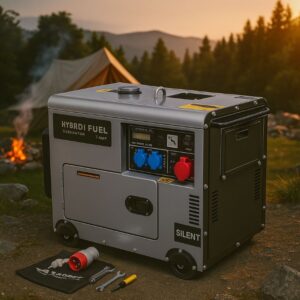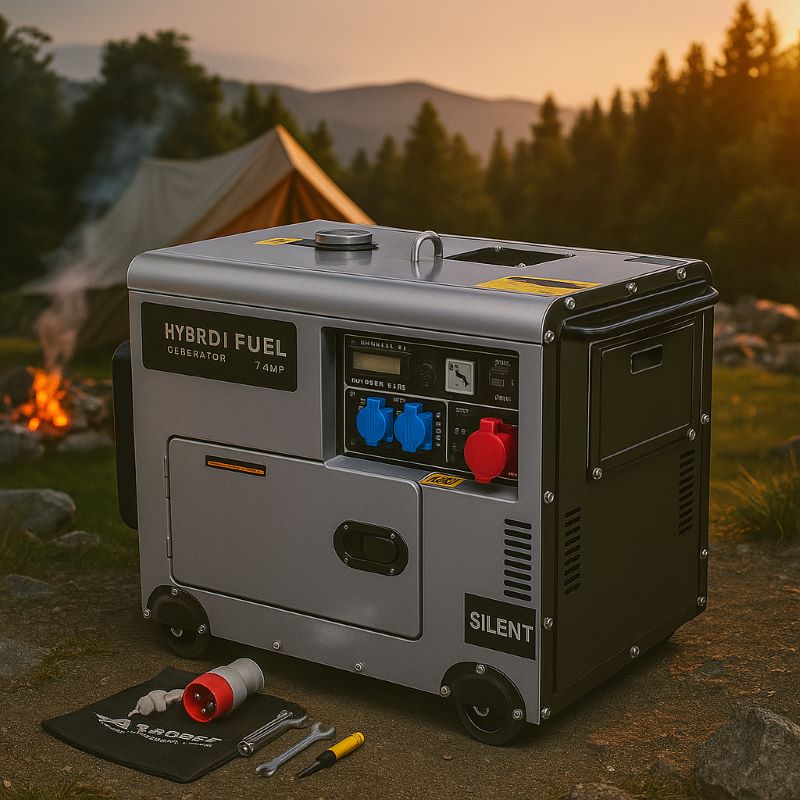Fuel Choice Is Key for Outdoor Power
Camping elevates with dependable power. Whether you seek lighting, cooking, or recharging devices, the ideal generator helps maintain comfort. Choosing between a gasoline propane generator, propane only, or a hybrid fuel camping genset affects performance, convenience, and cost. This discussion examines all three fuel sources, outlines their advantages and downsides, and highlights criteria for selecting the best match. As a trusted provider of portable generators, Dynxin helps campers make wise choices.
Understanding Fuel Options: Gas, Propane, Hybrid
Gasoline Generators
They deliver high energy density and performance. Gasoline weighs less per gallon yet holds more energy. As a result, generators running on gasoline produce longer runtimes and maximum wattage. They suit heavy loads, air conditioning, or powering tools. Gas also remains widely available at fuel stations. However, gasoline degrades within months and evaporates, potentially harming carburetors.
Propane Generators
Propane burns cleaner than gasoline and emits lower carbon. This means less engine wear and quieter operation. It stores indefinitely, making it ideal for emergency packing and intermittent camping. However, propane delivers about 80–85% of the power per volume compared to gas. Generators may run cooler, but also cost slightly more per kWh. Propane tanks can be bulky, and refilling may require propane supplier access.
Hybrid Fuel (Dual‑Fuel or Tri‑Fuel) Generators
These versatile units accept both gasoline and propane, sometimes even natural gas. You can switch fuels mid‑operation or use whichever is more convenient. This flexibility reduces downtime and allows longer runs. Hybrid systems usually cost more upfront and add complexity. Still, they deliver wider fuel resilience and a good compromise between performance and convenience.

Performance Comparison
Power Output and Efficiency
Gasoline generators typically yield peak power. For standard models, gas often gives 10–15% more output than propane on the same machine. For example, a Pulsar Explorer Bear dual-fuel unit delivers 4,000 peak watts of gas or 3,600 on propane. Hybrid models offer both options. However, the user must accept a slightly reduced capacity on propane.
Runtime and Fuel Longevity
Propane offers excellent long-term storage without breakdown. A 20-lb propane cylinder can run for up to 30 hours at light load levels. Gasoline requires a stabilizer if stored, and refueling is more frequent. Hybrid units let you switch fuels for extended runtime and simplified logistics.
Noise and Emission Levels
Propane burns cleaner and typically runs quieter than gasoline. Dual-fuel systems often operate at 58 dB at low load, keeping voice-level noise within camp area limits. Gasoline may produce more noise and CO emissions. All fuel types need CO detectors and ventilation.
Cold Weather Performance
Gasoline remains more reliable in cold conditions. Propane pressure drops as temperatures fall below freezing, reducing engine stability. Some hybrid generators include regulator systems to compensate, though performance may still lag slightly.
Considerations for Lightweight and Portable Camping Gensets
Weight and Portability
Campers prefer lightweight units. Typically, a 2–3 kW inverter generator weighs under 80 pounds safely tiltable. Gas-only models may weigh less due to simpler fuel plumbing. Hybrid models add valves and tanks, increasing weight slightly. Still, many versions include telescopic handles and wheels for towing ease.
Compact Form Factors
Inverter-style generators typically accept both fuels via dual outlets. They remain compact and fuel-efficient. Gasoline refill pipes are simple. Propane-only setups require heavy tanks. Hybrid units streamline portability by offering a flexible setup with small propane bottles.
Reliability for Remote Uses
In remote areas, fuel availability is not guaranteed. Gasoline may run out, while propane supply points may be rare. Having both capabilities gives more confidence in remote camping or extended trips.
Safety and Maintenance
Fuel Storage and Safety
Gasoline risks include spills and deterioration. Always store it in proper containers and use a stabilizer. Propane eliminates liquid spills and remains safe even if tanks sit idle. Hybrid models require strict filter maintenance and frequent valve checks.
CO and Overload Protection
Safety features such as overload shutoff and CO detection help protect users. Many modern generators, especially dual-fuel or hybrid models, include CO shutoff (e.g., CO Sentry) to automatically halt operation at unsafe CO levels. Dynxin integrates such safety systems in its units.
Environmental Impact and Emissions
Propane Burns Cleaner
Propane emits fewer particulates and greenhouse gases. Environmentally conscious campers may prefer propane or hybrid usage. Smart eco-modes on some units further reduce fuel use during light loads.
Hybrid Units Optimize Emissions
Hybrid systems allow selection of cleaner-burning fuel when possible, and switch to gasoline when higher output is needed. This flexibility can reduce overall carbon generation while preserving performance.
Regulatory and Site Restrictions
Changes in national park policies or local rules may restrict fuel types. Propane is often more acceptable in regulated zones. Hybrid units allow compliance flexibility.
Cost Analysis
Initial Cost vs Long Term Value
Gasoline generators cost less up front. Hybrid models cost around 10–20% more. Propane-only models may be pricier initially due to tank and regulator setup. However, lower maintenance, longer fuel shelf life, and cleaner operation may yield better long-term value, especially for infrequent use.
Operational Expense
Fuel cost per kWh may lean favorably towards gasoline due to higher energy density. However, propane’s lower maintenance needs and longer engine life reduce the total cost of ownership. Hybrid systems deliver optimal return when the user uses both fuels as conditions dictate.
 Hybrid Innovation and Future Trends
Hybrid Innovation and Future Trends
Solar‑Gasoline Hybrid Units
Newest units pair solar battery packs with gasoline backup. These hybrids offer silent solar output for light loads and switch to gasoline when needed. They cut noise and fuel consumption while boosting flexibility.
Smart Fuel Switching
Advanced gensets now include automatic switching between gas and propane based on fuel pressure, load demand, and ambient temperature.
Inverter and Eco‑Mode Advances
High‑efficiency inverter gensets offer cleaner sine wave output. Eco‑mode reduces engine revs at low loads to save fuel and provide quiet operation.
Use Case Comparisons
Weekend Campers and RVers
For short trips and RV access to propane hookups, propane or hybrid gensets offer quiet operation and long runtime without separate gas transport.
Remote Glamping or Off‑Grid
Where no fuel station exists, a hybrid genset lets you bring gasoline and propane options. Many users carry small gasoline cans and a propane cylinder for flexibility.
High Power Needs / Emergency Preparedness
If you need 4–7 kW output or surge capacity, gasoline typically delivers the best continuous power. Hybrid units support both fuel sources for emergencies and load peaks.
Eco‑Conscious Outdoor Enthusiasts
Propane-only or hybrid units give better emissions control. For campgrounds, festivals, or regulated outdoor zones, propane is often preferred.
Summary of Pros & Cons
| Fuel Type / Generator Type | Advantages | Drawbacks |
|---|---|---|
| Gasoline Generator | High power output, easy refueling, cheaper initial cost | Fuel degrades quickly, higher emissions, louder |
| Propane-only Generator | Cleaner burn, quieter, indefinite fuel storage | Lower power output, fuel cost per kWh is higher, and tank logistics |
| Hybrid Fuel Generator | Fuel flexibility, long runtime, performance balance | Higher initial cost, slightly heavier, and increased complexity |
Conclusion: Matching Fuel to Camping Style
Every camping style demands different features. If you camp near towns or refuel stations, a gasoline generator may suffice. If you value quiet, clean, and compact operation, propane-only works well. However, for the most reliable and adaptable option, hybrid fuel camping gensets deliver the best blend of performance, flexibility, and peace of mind.
At Dynxin, we deliver rugged, lightweight generator units engineered for all three fuel types. Our designs include smart eco-modes, CO shutoff awareness, silent recoil or electric start options, multiple outlet configurations, and portable frame designs to suit any camper’s needs.
Take time to consider your usage patterns, noise requirements, fuel access, and storage. Choose the system that fits your lifestyle. Whatever your preference, Dynxin offers trusted, modern camping generators built for real-world adventure.



